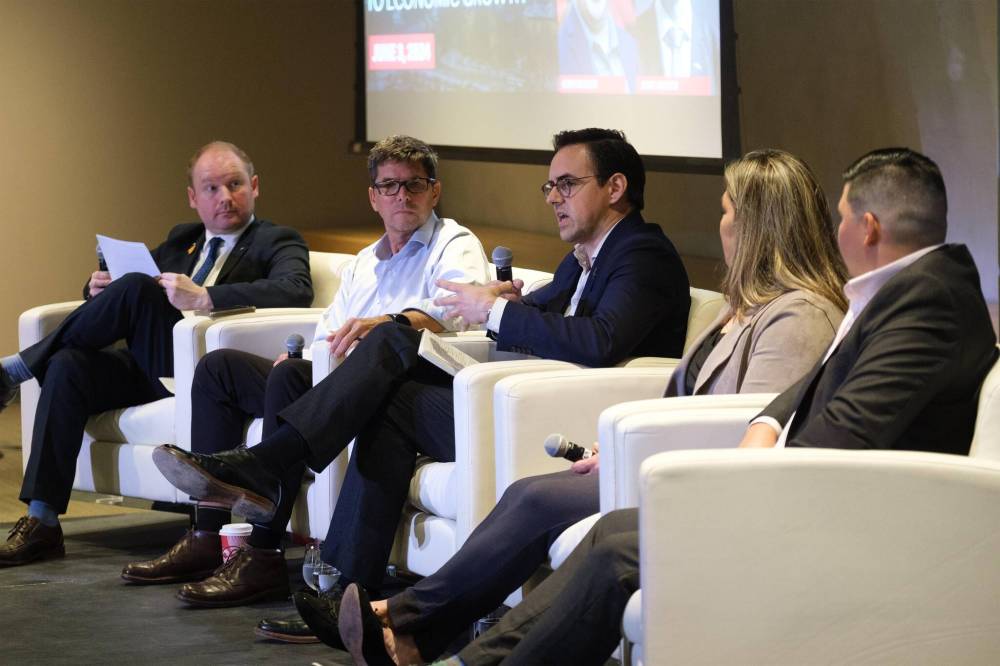IRPP panel spotlight on Indigenous economic development in Manitoba
Advertisement
Read this article for free:
or
Already have an account? Log in here »
To continue reading, please subscribe:
Monthly Digital Subscription
$1 per week for 24 weeks*
- Enjoy unlimited reading on winnipegfreepress.com
- Read the E-Edition, our digital replica newspaper
- Access News Break, our award-winning app
- Play interactive puzzles
*Billed as $4.00 plus GST every four weeks. After 24 weeks, price increases to the regular rate of $19.00 plus GST every four weeks. Offer available to new and qualified returning subscribers only. Cancel any time.
Monthly Digital Subscription
$4.75/week*
- Enjoy unlimited reading on winnipegfreepress.com
- Read the E-Edition, our digital replica newspaper
- Access News Break, our award-winning app
- Play interactive puzzles
*Billed as $19 plus GST every four weeks. Cancel any time.
To continue reading, please subscribe:
Add Free Press access to your Brandon Sun subscription for only an additional
$1 for the first 4 weeks*
*Your next subscription payment will increase by $1.00 and you will be charged $16.99 plus GST for four weeks. After four weeks, your payment will increase to $23.99 plus GST every four weeks.
Read unlimited articles for free today:
or
Already have an account? Log in here »
Hey there, time traveller!
This article was published 03/06/2024 (505 days ago), so information in it may no longer be current.
Just a few years ago, it would have tough to put together a panel discussion in Winnipeg about Indigenous approaches to economic growth made up entirely of experienced Indigenous practitioners.
On Monday, the Institute for Research on Public Policy hosted such an event, featuring a vice-president of a post-secondary institute, a business owner whose venture has been around for 10 years, a senior executive for the largest urban reserve in the country and the owner of an consulting business.
Their presence alone is a sign progress has been made, notwithstanding all panelists acknowledged significant challenges that had to be overcome and still exist.

JOHN KRISTALOVICH PHOTO
Steve Lafleur, research director at the Institute for Research on Public Policy (far left) moderates a panel discussion on Indigenous approaches to economic growth at the Montreal-based organization’s annual meeting in Winnipeg on Monday with Jamie Wilson, Alian Beaudry, Michelle Cameron and Cody Mercer (left-to-right).
Michelle Cameron, owner of Dreamcatcher Promotions, which employs 66 people, said she would have benefited from mentors when she started out — which is why she regularly makes herself available to other Indigenous entrepreneurs starting out.
In conversation, Cameron said she saw an Indigenous bank teller when she was 16 and “a light bulb went off. I can be a bank teller! I wish there were more people I could look up to.’”
It’s a refrain that can be heard often in the discussion of Indigenous economic development in Manitoba. The idea of reconciliation has now become commonplace, but it means different things to different people.
Cody Mercer, supply chain manager at Treaty One Development Corp., the group responsible for the development of Naawi Oodena in south Winnipeg, said when it receives inquiries from companies that want to partner with Treaty One, those that ask how they can pursue reconciliation are put at the top of the list.
“We may not even really need to work with them, but it shows they are sincerely interested, as opposed to the companies that just want to be seen as working on reconciliation,” he said.
Jamie Wilson, vice-president of Indigenous strategy at RRC Polytech, has had a firsthand look at the progress in Manitoba the past 10 years. He is a former commissioner of the Treaty Relations Commission of Manitoba, the first employee of Arctic Gateway Group (after it acquired the Hudson Bay Railway and Port of Churchill) and former provincial deputy minister of economic development.
While he said Monday conferences about economic development are not economic development, he did acknowledge recent dialogue is “super.”
He pointed out the original treaties with First Nations had to do with the rights to livelihoods and economic partnerships into the future. “Having these kind of discussions rekindling old relationships and old ways of doing things, is to me a very exciting thing.”
Meanwhile, Wilson is part of an institution that’s not only hired 30 Indigenous people in the last year but has put together what he believes is the best social procurement policy he’s ever seen.
Alain Beaudry, principal at Waapihk Research, said, from a longer-term perspective, he sees educational investments being made in Indigenous communities that will “translate into really meaningful outcomes in a generation or two.”
Beaudry, who is also a medical doctor, is chairman of the Indigenous admission stream for the Max Rady College of Medicine at the University of Manitoba, said there are more Indigenous students than ever before getting into medical schools.
The Institute for Research on Public Policy holds its annual general meetings in different cities across the country every year. Jennifer Ditchburn, CEO of IRPP, said the topic of the Winnipeg panel discussion is relevant both to the region and to IRPP research.
“We believe you can’t talk about Canadian economic growth without talking about Indigenous economic growth,” she said.
Among other things, she said having dialogue between governments – including First Nation governments – loosens constraints and allows First Nations to be masters of their own economic fates.
“We need to learn to be economic partners instead of the weird paternalistic relations we’ve had for more than a century,” Ditchburn said.
martin.cash@freepress.mb.ca

